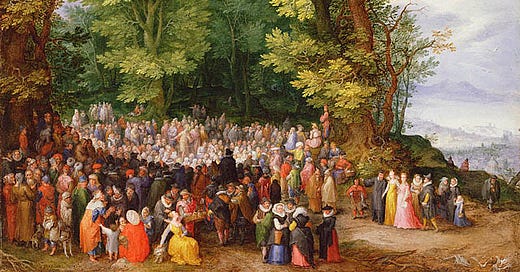We all experience glimpses of the Kingdom of God. I fondly remember my sixth form Biology class in college. Our class was housed in a disconnected small converted gardener’s building, at the far side of the school compound. The sixteen of us met there daily to learn Botany and Zoology from two inspiring teachers, one of whom was a priest.
It was there we built a community to learn to disect cockroaches and frogs and make sections of plant stems and look at flowers under a microscope. We bonded, laughed, teased, prayed and helped each other understand the theory and learn the skills. No one was left behind, and each was supported to reach his full potential.
In this week’s Gospel Mark 4: 26-34 Jesus gives a lesson on the Kingdom of God on earth. He likens it to the growth of a mustard seed that blossoms into a large shrub. This is a great description of our Biology class. We first met as sixteen small boys but grew into a community, a living learning praying organism such that no task was beyond us.
The Church defines the Kingdom of God as both a present reality and a future hope. It is the reign of God on earth manifested through the life, teachings, death, and resurrection of Jesus Christ. This kingdom, present on earth, is characterized by righteousness, peace, and joy in the Holy Spirit and is wherever God's will is done. The Kingdom of God has no geography. It's more like a force or tone that permeates and manifests itself. It permeated and manifested itself in our sixth form Biology class.
The Kingdom of God is a power inherent in creation. It is God's reign. It is the dynamic of growth and grace. St. Paul hinted at this when he said, ‘All creation is groaning in one great act of giving birth (Romans 8:22). Some theologians call this creation's "initial aim," an inborn purpose and energy attracting everything toward union in God. Whatever does not collaborate in the movement will disappear "like chaff driven in the wind" (Psalm 1).
Because it is creation's destiny, we can do no more than collaborate or temporarily hinder it. The paschal mystery teaches that it cannot be stopped.
As people of the resurrection, we can understand Jesus' metaphor as an assurance that God's reign is here and there and everywhere, and that it will be the future of everything. The reign of God is among us. We're on the way to it and we can embrace it as our way of life.
The Church teaches that the Kingdom of God on earth is a call to social justice, love, and service to others. It will be fully realized in the eschatological future when Christ will come again in glory to judge the living and the dead, and God's reign will be established in its fullness.
Everyone is called to be a part of the kingdom. The kingdom belongs to the poor and lowly of heart. Jesus invites sinners to the table of the kingdom. Jesus’ invitation to enter the kingdom comes in the form of parables. The coming of God’s kingdom means the defeat of Satan’s.
The Kingdom is made present when individuals and communities embody Christ’s teachings, work towards peace, and strive for social justice, reflecting God's love and compassion. Additionally, we encounter the Kingdom in moments of grace and through the workings of the Holy Spirit, inspiring and guiding us to live in harmony with God's will. The Kingdom of God became a tangible reality in our lives in Biology class.
Some theologians speak of the Kingdom of God within us and emphasize the inner, spiritual dimension of God's reign. This notion is rooted in the words of Jesus, who said, "The kingdom of God is within you" (Luke 17:21). Theologically, it means that the Kingdom begins in the heart of each believer, where God’s presence and grace transform the individual from within. This inner transformation is characterized by a deepening relationship with God, a growing alignment with His will, and the cultivation of virtues such as love, joy, peace, patience, kindness, and self-control.
The Kingdom of God within us implies that our internal spiritual life has a direct impact on the external world. When individuals nurture their inner connection with God through prayer, meditation, and reflection on Scripture, they become vessels of God's love and peace, which naturally extend to their interactions with others.
Often I reflect on our Biology class and wonder why did the Kingdom manifest itself there. Was it the location, apart from? Was it our Botany priest teacher? Was it the act of learning together? Was it the subject matter, life? Was it our stage of growth? Was it our innocence? Whenever I become part of a group, I harbour a personal desire for the kingdom to manifest itself. Sometimes I experience glimpses of it. I hope you can too.
NOTICE BOARD
Friends, I am posting a few links below to different offerings available on my website. I hope you find time to view them, and hopefully participate.
VIDEO LINK TO INRODUCTION TO BENEDICTINE SPIRITUALITY AT HOME AND WORK
LINK TO JOIN BENEDICTINE SPIRITUALITY PROGRAM





Very rich insights on the Kingdom of God thank you Deacon!